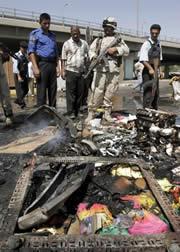 This bomb in Baghdad reportedly killed at least eight people and wounded 31.MOHAMMED HATO/AP/EMPICS
This bomb in Baghdad reportedly killed at least eight people and wounded 31.MOHAMMED HATO/AP/EMPICSHave over 650,000 people, or 2.5% of the population, really died in Iraq as a result of the US-led invasion?
That's the conclusion of a study published in The Lancet this week. But the number has attracted criticism from other researchers who say the result is a major over-estimate, and may have been published for political reasons.
The team behind the figures strongly denies the criticisms. They stress that their methods are well established, and the assumptions they use are validated by other data.
The new number comes from a survey of 1,849 households in 16 regions of Iraq. Teams of questioners organised by the Al Mustansiriya University in Baghdad asked people about household members that had died between January 2002, before the invasion, up to July 2006. They documented 82 deaths in the period before the invasion, and 547 during the conflict.
An extrapolation of this data suggests that the number of deaths per thousand people per year has leapt from 5.5 to 13.3 over that period. Across the whole country, say the researchers, that figure equates to a total of 654,965 more deaths than would have been expected from pre-invasion rates. Just over 600,000 of those were caused by direct violence, the team adds.
The figure is much bigger than previous estimates.
Conflict figures
"I doubt it is large as they say," says Jon Pedersen, a social scientist at Fafo, an independent research centre is Oslo, Norway. Pedersen helped run a United Nations study that concluded between 18,000 and 29,000 people died as a result of violence between the start of the war and May 2004.
He says that violence has become more frequent since his study, but doubts whether the real number can be so much bigger than media reports suggest. Iraq Body Count, a website that collates mortality figures from media sources, puts the current figure at around 45,000.
"We are told about at least 30 to 40 deaths per day just from news reports," says Pedersen. "But 500 per day is very different."
Pederson also points out that the pre-invasion death rate recorded by the Al Mustansiriya team is very low. Figures from the United Nations Children's' Fund from before the war put the number at around 13 deaths per thousand per year. If correct, this suggests almost no increase that can be attributed to the conflict.
But Gilbert Burnham, co-director of the Center for Refugee and Disaster Response at Johns Hopkins University in Baltimore, Maryland and a member of the team that helped design the study, says that neither criticism stands up to scrutiny. He says that pre-war mortality figures from other sources, such the US Central Intelligence Agency, are in line with his data.
Reports of deaths, adds Burnham, were backed up by a death certificate in 92% of the 629 cases they collected. "We recorded what people told us," he says. "We're not making up deaths."
Election countdown
Burnham's group is having also to fight off criticism that its work is somehow political in nature. When he released a previous estimate of Iraqi death tolls in 2004, one team member said that they had wanted to get the result out before the US presidential election, so that "both candidates would be forced to pledge to protect civilian lives in Iraq". The quote was then used by supporters of the Iraq war to brand Burnham's research as politically biased.
With mid-term US elections due next month, Burnham's team is open to the same accusations. Debarati Guha-Sapir, director of the Centre for Research on the Epidemiology of Disasters in Brussels, says that Burnham's team have published "inflated" numbers that "discredit" the process of estimating death counts.
ADVERTISEMENT
"Why are they doing this?" she asks. "It's because of the elections."
"Absolutely not," replies Burnham. He says that the paper has been delayed and that he hoped to have it out in July or August. "In our team we have some people who are opposed to the war and some who are in favour," he notes. He points out that Iraq has been in the news constantly over the past year, and so his team would have been accused of playing politics no matter when the paper was published.
Visit our iraqideathestimatespar.html">newsblog to read and post comments about this story.
